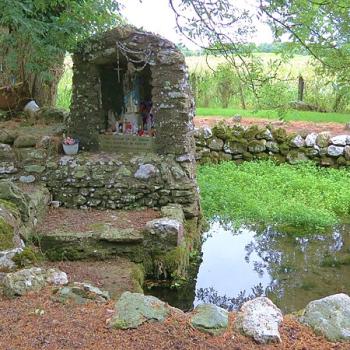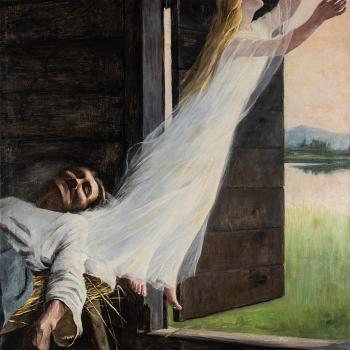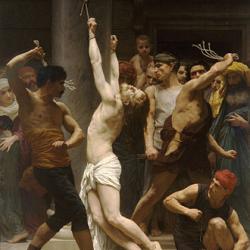"That man is a saint; he comes here every single day," another woman said, admiringly. "He brings his lunch. His wife doesn't recognize him, so every day, he's just a newly-met friend, who has lunch with her."
"That's so sad," I said.
But he did not seem sad as he walked passed us, greeting my neighbor. When I asked her about it later she said, "yes, when we told him he does not need to come every day, he said, ‘but she is my bride, my love; if I did not see her, I would miss her.'"
The man's wife had changed, but -- in contrast to the narrative of the CBS piece -- she was not "gone." If she was no longer capable of seeing her groom, he still beheld and adored his bride; his love adjusted, and remained. Their marriage, truly, was the microcosmic reflection of the macro-love of God for his people and the love of Christ for his church. Love without limit, love without fear, love without desertion; love in joy and love in pain, love in difficult times, love in changing circumstances, love held in secret, love in the shallows and the depths, love without end. We cannot see God except as he is made manifest through us, and in the covenant of marriage his faithfulness is beautifully reflected. We look to this manifestation -- in all its turbulent courses -- to get an inkling of him. When we cannot see the great love of God reflected so near to us, we are diminished.
This love is not beyond us; it is sustained within us. When it is rationalized into relativistic limits, we have sold love, and ourselves, short. If God is love, we have sold God short, too. We have chosen to walk around a fire, rather than through it, and so we cannot know what would have emerged from it. We have chosen not to trust that our sufferings have meaning and that they are, on balance, the crucibles of our commonalities, which mold and strengthen our societies.
When my brother was in the last stages of a long illness, his suffering was terrible to watch, but also beautiful to share in. At one point, in a journal, I wrote:
The great paradox of love is that for all the joy it brings, it also brings pain. Love and pain cannot exist exclusive of each other, and joy fits itself, somehow, between the two. . . .
We have been trained in the secular world to disregard life as something holy and to understand that our human potential is inextricably tied to our personal freedoms and our domination over those uncontrollable matters of life: death, pain, and joy. This is a great deception. The truth is, just as human expansion upon the earth depended upon someone being willing to explore those uncharted waters marked, "Here be monsters," our human potential can only grow when it is open to exploring the Unknowable. The vehicle for that exploration is faith. If the monsters of life are pain and suffering, fear and doubt, moving through them is what leads to discovery, growth, and -- yes -- holiness. God does not give us more than we can endure, but we cannot ascertain on our own precisely how much strength we have.
It is impossible to explore the depths of our potential, or its limits, if we steadfastly refuse to take the journey. But increasingly, that refusal is being regarded as wisdom.
It is worth asking whether either Barry Petersen or my neighbor's acquaintance were formed in faith or rooted firmly in secularism. Petersen subtitled his book, "love lost to the long-goodbye of Alzheimer's," and that suggests a perspective that sees love, and life, as finite -- a measure brought to close, and the rest is silence. To the nameless, lunch-bearing husband, love was not lost; it was wholly there, and alive. Clearly, Petersen's love is not "lost," either, but perhaps he cannot quite perceive its nearness because he has dropped the lens of eternity. Lacking that view, Petersen's circumstances can only seem to many to be unendurably bleak, and his choices thus heroic.
Surely the Lord does not encourage us to do something impossible to human nature because the magnitude of what he commands is beyond the reach of our human strength? The truth is different. He does not command those creatures to whom he has not given wings to become birds, nor those to whom he has assigned a life on land to live in water. If then in the case of all other creatures the command is according to the capacity of those who receive it, and does not oblige them to anything beyond their nature, we shall come to the conclusion that we are not to give up hope . . .
- St. Gregory of Nyssa
The hard times are endurable, and suffering can be borne. If humanity no longer believes that, it will quickly extinguish itself, in an effort to go through life being shielded from pain, and feeling nothing but "fine."




